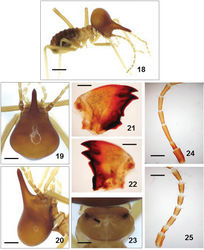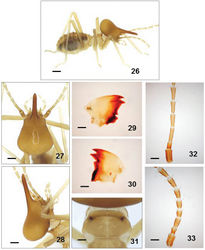Longipeditermes kistneri
| Notice: | This page is derived from the original publication listed below, whose author(s) should always be credited. Further contributors may edit and improve the content of this page and, consequently, need to be credited as well (see page history). Any assessment of factual correctness requires a careful review of the original article as well as of subsequent contributions.
If you are uncertain whether your planned contribution is correct or not, we suggest that you use the associated discussion page instead of editing the page directly. This page should be cited as follows (rationale):
Citation formats to copy and paste
BibTeX: @article{Syaukani2019ZoosystematicsandEvolution95, RIS/ Endnote: TY - JOUR Wikipedia/ Citizendium: <ref name="Syaukani2019Zoosystematics and Evolution95">{{Citation See also the citation download page at the journal. |
Ordo: Blattodea
Familia: Termitidae
Genus: Longipeditermes
Name
Longipeditermes kistneri Akhtar & Ahmad, 1985 – Wikispecies link – Pensoft Profile
- Longipeditermes kistneri Ahktar and Ahmad 1985[1]: 215–217. Bogor, West Java.
Material examined
SYK1998 & 1999-L-1098, 2001, 3011: soldiers and workers from the undisturbed forest, 1100–1400 m altitude, Kemiri Mountain, Southeast Aceh, Aceh, Sumatra.
Soldier
(Figs 18–20, 23, 24, 26–28, 31, 32). Bimodal continuum in size. Major soldier (Figs 18–20, 23, 24). Head capsule pale to dark brown, in dorsal view somewhat triangular, very weakly constricted behind antennal sockets, with posterior margin roundly convex; dorsal outline (including nasus) in profile moderately concave; rostrum feebly bicolored, with apical 2/3 darker and basal 1/3 paler. Mandible with short to long apical processes. Antenna with 14 segments, much paler than head capsule; 1st and 2nd antennal segments darker than the following segments, which are uniformly colored; 3rd approximately 1.5 times as long as 4th; 5th slightly shorter than 4th; 6th–14th gradually shortening toward the apex. Pronotum in dorsal view as pale as or paler than head capsule; anterior margin indented in the middle; posterior margin weakly indented in the middle. Coxae and femora yellowish to pale brown; tibiae pale yellow to yellow. Abdominal tergites brown to dark sepia brown. Measurements and index (20 major soldiers from 10 colonies): HLN 2.22–2.43 mm; HL 1.62–1.68 mm; NL 1.02–1.12 mm; NL/HL 0.66–0.73 ; HWA 0.86–0.90 mm; HWP 1.63–1.71 mm; HH 0.98–1.04 mm; PL 0.40–0.44 mm; PW 0.77–0.82 mm.
Worker
(Figs 21, 22, 25, 29, 30, 33). Monomorphic but showing size variation. Worker (large-sized) (Figs 21, 22, 25). Body pale brown to brown. Left mandible with apical tooth shorter than 1st marginal tooth; 3rd marginal weakly protruding from cutting edge; 4th not completely hidden behind molar prominence. Right mandible with posterior edge of 2nd marginal tooth nearly straight; the inner layer of the molar plate very weakly concave; notch moderately to strongly developed. Antenna with 15 segments, with 1st and 2nd segments slightly darker than the following segments; 3rd clearly longer than 4th; 4th–6th nearly equal in length; 7th–15th gradually shortening toward the apex.
Distribution
Sumatra and Java.
Taxon Treatment
- Syaukani, S; Thompson, G; Yamasaki, T; Othman, A; Muarrif, S; Sarong, M; Djufri, D; Eguchi, K; 2019: Taxonomy of the genus Longipeditermes Holmgren (Termitidae, Nasutitermitinae) from the Greater Sundas, Southeast Asia Zoosystematics and Evolution, 95(2): 309-318. doi
Images
|
Other References
- ↑ Akhtar M, Ahmad M (1985) A new nasute termite from Java (Isoptera: Termitidae: Nasutitermitinae).Pakistan Journal of Zoology17: 215–217.

